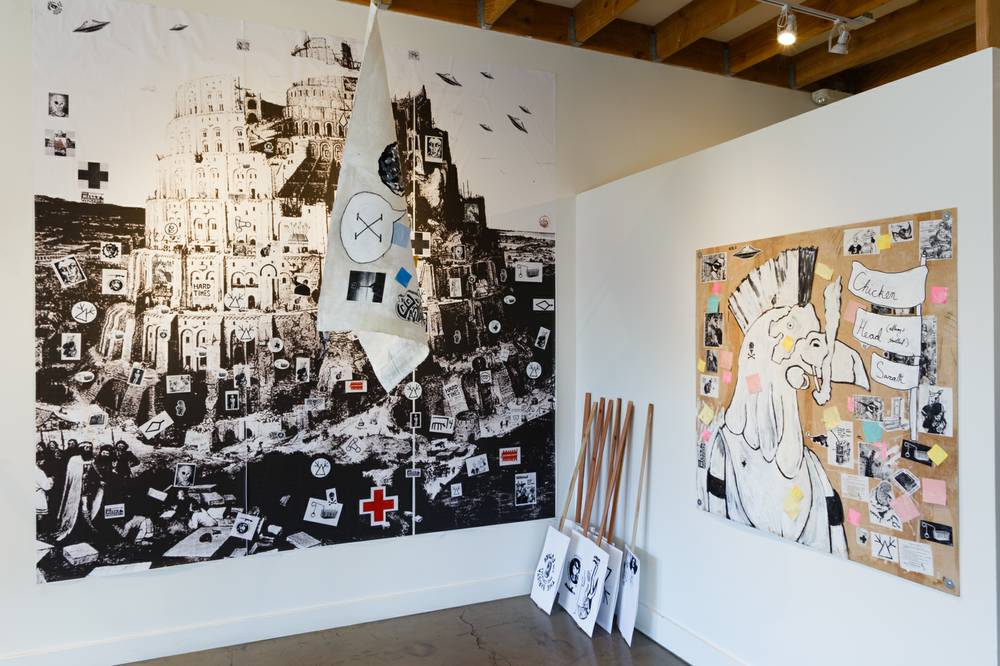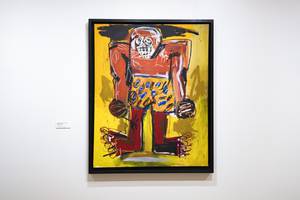Stickers, drawings and indecipherable handwritten messages populate the canvases hanging inside Adam Turl’s latest exhibit. The characters—rats, possums, sex robots, chickens and baristas—recur in the form of black and white cartoon portraits, each one a tongue-in-cheek caricature of individuals or ideas that Turl has encountered in his own life. “Billy,” the “all lives matter” opossum, for example, or Ms. “Against Punching Nazis” (which is really just a drawing of a fist literally clutching pearls)—you get the idea. The “inspiration” of the Revolt of the Swivel Chairs is the brainchild of Turl’s own labyrinthine creation, a story based on his fictional character Alex Pullman, an artist and coffee shop worker who believes he can see visions of the future.
“I’m really interested in simultaneously dystopian and utopian impulses,” Turl says of his exhibit, a spin-off of 2015’s Thirteen Baristas. On one hand, a new generation of young people and millennials are engaging in politics and rallying behind alternatives to capitalism and the status quo, “but at the same time we have catastrophic problems and the return of neo-fascists, the alt-right and global warming,” Turl adds, “that create an existential question for the human species, so I’m interested in those two things existing at once. People beginning to dream of an alternative to the way things are, but the possibility that it’s too late.”
The Revolt of the Swivel Chairs, based on the Tower of Babel myth, is Pullman’s most recent vision—a prophecy in which humans live in a giant waterproof office building following catastrophic floods (a result of global warming). The fictionalized story is explained throughout a series of diptychs peppered with pen-and-ink portraits, neon post-it notes, gold-painted cat turds or “luries” (The asking price? Just a measly 230K), protest signs and of course, swivel chairs.
“I’m using a critical realist or speculative fiction framework to tell a working-class story,” Turl says, an avid history buff with a wealth of knowledge on everything from politics to art and everything in between. “I’m interested in how things are part of a whole, the totality, but [how] they're also individual and unique at the same time, and that’s kind of the push and pull.”
To assume that’s Revolt is merely Turl’s interpretation of a fictitious vision would be missing the point. Like the DIY zines that sprouted from various political and punk movements in the ‘80s and ‘90s, Revolt is as much a record of our current political state as it is an exchange of thoughts on those observations (you’re even encouraged to take stickers and a zine with you). Embodying a DIY aesthetic, each wall feels as if it were a sheet of newspaper torn from the pages of a post-apocalyptic manifesto, and The Revolt of the Swivel Chairs amazingly materializes the look and feel of those zines, bringing their flattened imagery to life. By trading photocopied images for hand-painted, life-sized renderings, Turl makes his imagination tangible—a papier-mâché canvas fraught with pops of colorful, crust-punk whimsy and vivid satirical chaos.
The Revolt of the Swivel Chairs Through March 31, Thursday-Sunday, noon-6 p.m., free. The Cube, 1025 S. 1st St. #150, 702-483-8844.



![“I wanted people. … [And] the cakes, looking like hats, are their thoughts and desires visualized.”](http://media.lasvegasweekly.com/img/photos/2022/04/27/0428_Art_Shan-Michael-Evans_Staff_Christopher-DeVargas_r190x108.jpg?865431e890af804dfed7ccab93b8b85c95853c35)



